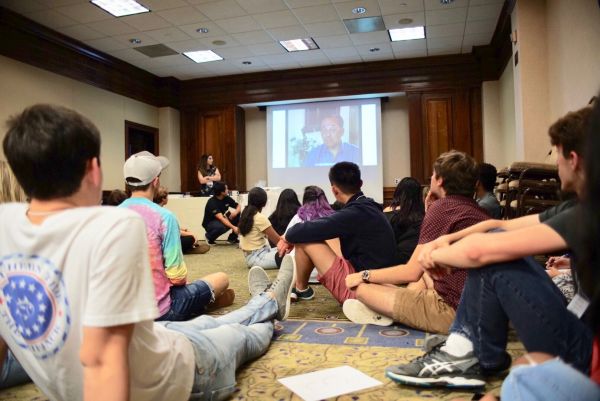USC student government kicks off the year with an IWitness activity

His story resonated with the roughly 80 members of USC student government who watched a clip of his testimony as part of their kickoff retreat for the school year.
This is the first year USC’s Undergraduate Student Government leaders have used the Institute's testimony for the annual orientation event. The clip of Bass and other genocide witnesses came from a new IWitness University activity called "Countering Intolerance in Co-Curricular Spaces."
“One of my favorite parts of that activity was, upon getting feedback from the retreat, a lot of our students voiced their newfound appreciation of sharing stories with the organization,” said Shany Ebadi, co-chief of diversity on the student government body. “I know my coworkers on a more personal level.”
One African American student at the Aug. 10-12 event shared with the group how, when he was in high school, a white student picked a fight with him. He tried to defend himself, but wound up getting hurt because the other student knew martial arts. School administrators assumed the black student started the fight and so he, and not the white student, was suspended.
“There’s a lot of learning that still needs to be done, to make sure administrators are aware of their own biases” said Milton Dimas, the USG’s other co-chief of diversity.
The IWitness activity was co-authored by a member of the Intercollegiate Diversity Congress, a group of student leaders from across the United States who convene at USC Shoah Foundation in Los Angeles to address issues pertaining to race and identity on their campuses. The Congress, which is part of the Institute’s Stronger Than Hate programming, will hold its annual summit at the Institute from Sept. 7-9.
Dimas said one of his goals this year is to instill in the USC student body the idea that, historically, university students have been the drivers of social change in the United States and elsewhere.
“At Berkeley during the Free Speech movement, they would just go in the quad and start protesting," he said, referring to the thousands of students who demonstrated against the campus's ban on political activity in the 1960s. "The level of corruption that the UC system in Berkeley was doing, and how it was limiting their voices, what did students do? They rose up against that.”
Ebadi and Dimas said they want to help amplify the voices of disenfranchised students.
“The overall message we want to promote is, if there is something that is bothering you in terms of intolerance – something’s not diverse or inclusive enough – that we should be contacted,” Dimas said.
Dimas said he knows from firsthand experience what it’s like to feel out of place with no support system.
He was one of just two Latino students in his class at a private high school in affluent Marin County. When it emerged that somebody had tagged the school with graffiti, a local controversy erupted, and administrators called him to the principal’s office.
“I just ended up having multiple meetings with administrators -- them constantly asking me whether or not I’d actually done this, and me having to say again and again that no, that wasn’t me,” he said. “And then finally ending with, ‘It wasn’t one of your homies, or anything like that?’ It was just a terrible experience.
“It again comes back to this mindset that isn’t changed,” he added. “Times are changing and people need to change as well.”
At the retreat, students also responded well to another clip in the IWitness exercise, of Silja Vainer, who described the comfort she derived from joining a Jewish-Muslim-Christian interfaith group that engaged in community outreach.
Ebadi said this is an excellent example of taking action to foster empathy.
“We went back to our groups and discussed that evolution of the idea of, ‘Let’s not just let the problem simmer, but let’s think about ways to combat it,’” she said. “Let’s all develop our campus action plans in very detailed and specific ways of what exactly needs to be addressed.”